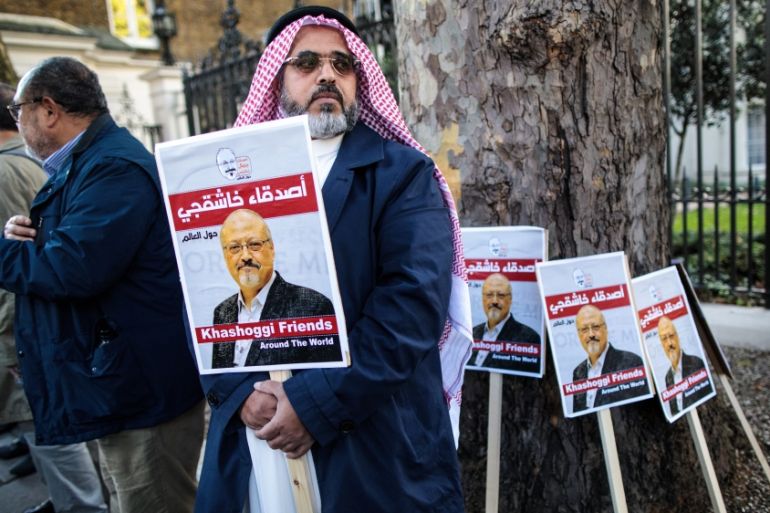Saudi opposition joins forces in London to tackle ‘oppression’
Speakers at second Saudi diaspora conference say time to unite is now after murder of journalist Jamal Khashoggi.

London, United Kingdom – Saudi opposition figures from all over the world have called for a coordinated effort to challenge Saudi Crown Prince Mohammed bin Salman‘s “oppressive” rule over the kingdom.
Speakers at the second Saudi diaspora conference said after the killing of Saudi journalist Jamal Khashoggi in the Saudi consulate in Istanbul in October, the time was right for a united front against the prince’s hardline policies.
Keep reading
list of 4 itemsGeorgia’s president vetoes controversial ‘foreign agents’ bill
‘Regime machinery operating efficiently’ as Tunisia cracks down on dissent
Why Egypt backed South Africa’s genocide case against Israel in the ICJ
Organised by Diwan London, a discussion hub with a focus on the Arabian Peninsula, and Saudi human rights organisation ALQST, the conference on Sunday had the participation of activists from the United States, Canada, Australia, Germany, Switzerland and other places.
Many activists, including the son of jailed Muslim scholar Salman al-Odah, 61, who is known for his progressive positions on controversial issues, addressed the gathering via video call.
A Saudi prosecutor called for the death penalty for Salman al-Odah in September during a secret trial.
![Dozens of Saudi dissidents addressed the second Saudi diaspora conference in London [Nadine Dahan/Al Jazeera]](/wp-content/uploads/2018/12/1cbb929ce2d847649e3e5c62d62d994c_7.jpeg)
Due process
Sunday’s conference was a prelude to ALQST’s second annual summit on the decline of human rights in Saudi Arabia, which was held on Monday.
“This opposition calls for rights, democracy, equality and due process. We are all calling for the same thing,” said Yahya Assiri, head of ALQST.
“None of our opposition is calling for rights of some over others, we only differ over how to get there.”
The dissidents said the meetings were a significant and unprecedented step towards a coordinated and united front against the Saudi government’s widespread crackdown on critics, which has seen scores imprisoned, tortured and stripped of their assets.
Madawi al-Rasheed, visiting professor at the LSE Middle East Centre, also highlighted the need to unify.
“This conference is the start,” she said. “I get asked why aren’t Saudi dissidents united? But uniting the opposition doesn’t mean all of us agreeing… We have different voices and all of them should be heard.”
The conference saw prominent opposition figures such as 72-year-old Mohamed al-Massari – an exiled Saudi physicist, political dissident, and chair of the Committee for the Defense of Legitimate Rights – the first independent human rights organisation in the kingdom. Massari was granted asylum in the United Kingdom in 1994.
|
|
Khashoggi killing
Khashoggi’s murder sent shockwaves throughout the international community. However, the response from governments has not been met with great enthusiasm.
Assiri said while Khashoggi’s case forced the international community to reconsider its relationship with the Gulf kingdom, the reaction didn’t go far enough.
Speaking about the way in which the regime has changed since Prince Mohammed toppled his cousin, Mohammed bin Nayef, in June 2017 to become crown prince in the kingdom, Assiri said: “The type of torture has worsened, the regime has changed. The regime has fallen in the eyes of the national community. It has no legitimacy.”
He said Saudi authorities smear their critics as spies, “agents of the West”, or traitors.
Political prisoners
Many women’s rights activists who were some of the first to champion their right to drive in the kingdom also spoke at the conference, calling for the immediate release of those locked up.
Amani al-Ahmadi said: “We never expected things to reach this level of monstrosity.”
|
|
Ahmadi spoke of the reports of sexual harassment being used as punishment against female detainees held after a wave of arrests of women’s rights activists earlier this year.
“Women have been second-class citizens,” she said. “Only with the freedom of women can society be free.”
While Prince Mohammed has presented himself as a “reformist”, he has imprisoned activists, religious reformists and academics without charge.
“The struggle has reached every home,” Assiri said. “Everyone is struggling with unemployment, with repression.”
But Assiri added he believes things are changing. “Opposition to the regime is fashionable now. Lots of the youth define themselves as human rights defenders and feminists,” he said.